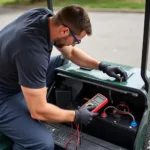A car diagnostic test is essential for identifying issues within your vehicle’s systems. It uses a specialized tool to communicate with your car’s computer, revealing hidden problems and helping pinpoint the source of malfunctions. But how does this process actually work? This article will delve into the intricacies of car diagnostic tests, explaining the technology behind them and highlighting their importance in modern vehicle maintenance.
If you’re looking to buy your own diagnostic tool, knowing how they work is essential. Check out our guide on buying a car diagnostic tool for some helpful advice. buy car diagnostic tool
Unveiling the Secrets of the OBD-II Port
At the heart of a car diagnostic test lies the OBD-II port, a standardized 16-pin connector typically located under the dashboard on the driver’s side. This port acts as the gateway to your car’s internal network, allowing a diagnostic tool to access data from various electronic control units (ECUs). These ECUs manage everything from the engine and transmission to the airbags and anti-lock brakes.
Communicating with Your Car’s Computer
The diagnostic tool, often a handheld scanner or software on a laptop, connects to the OBD-II port and initiates communication with the ECUs. This communication follows standardized protocols, allowing the tool to request specific data and receive responses. The data transmitted includes diagnostic trouble codes (DTCs), sensor readings, and other operational parameters.
Decoding Diagnostic Trouble Codes (DTCs)
DTCs are alphanumeric codes that represent specific malfunctions detected by the car’s onboard diagnostic system. These codes are like clues, pointing towards potential issues within various systems. A diagnostic tool retrieves these codes and displays them, often accompanied by a brief description of the problem. For instance, a code like P0301 might indicate a misfire in cylinder 1.
From Codes to Solutions: Interpreting the Data
While DTCs provide valuable insights, they don’t always pinpoint the exact cause of the problem. They often represent symptoms rather than the root cause. Therefore, interpreting the data requires further investigation and expertise. Mechanics use their knowledge and experience, combined with additional tests and inspections, to accurately diagnose the issue.
 Mechanic Analyzing Diagnostic Trouble Codes on a Laptop
Mechanic Analyzing Diagnostic Trouble Codes on a Laptop
Beyond DTCs: Real-Time Data and Advanced Diagnostics
Modern diagnostic tools go beyond simply retrieving DTCs. They can access real-time data from various sensors, allowing mechanics to monitor the performance of different systems in real-time. This capability is crucial for diagnosing intermittent problems or issues that don’t trigger DTCs. Additionally, advanced diagnostic software can perform specific tests and calibrations, further enhancing the diagnostic process.
You can even find sophisticated diagnostic software for your own use. Learn more about it in our article about car diagnostic tool software. car diagnostic tool software
The Role of Expertise in Car Diagnostics
While diagnostic tools are powerful instruments, they are just tools. The expertise of the mechanic remains crucial. Interpreting the data, identifying the root cause of the problem, and determining the appropriate repair strategy requires experience, knowledge, and critical thinking. “A diagnostic tool is like a stethoscope for a car,” says renowned automotive expert, Dr. Emily Carter, “It provides valuable information, but it’s the doctor, or in this case the mechanic, who uses that information to make the diagnosis.”
Conclusion: The Power of Preventive Diagnostics
Understanding how a diagnostic test works on a car empowers car owners to make informed decisions about their vehicle’s maintenance. Regular diagnostic tests, even in the absence of noticeable problems, can help identify potential issues early on, preventing costly repairs down the road. “Preventive diagnostics are like regular check-ups for your car,” adds Dr. Carter, “They can catch small problems before they become big headaches.” So, embrace the power of car diagnostic tests and keep your vehicle running smoothly for years to come.
FAQs
-
How often should I get a car diagnostic test? It’s generally recommended to have a diagnostic test performed annually or whenever you experience any unusual symptoms.
-
Can I perform a diagnostic test myself? Yes, you can purchase OBD-II scanners and software for personal use, but interpreting the data accurately often requires expertise.
-
Are all diagnostic tools the same? No, diagnostic tools vary in their capabilities and features. Some offer basic functionality while others provide advanced diagnostics and real-time data.
-
What should I do if my car has a diagnostic trouble code? Consult a qualified mechanic to diagnose and address the underlying issue.
-
How much does a car diagnostic test cost? The cost varies depending on the complexity of the test and the location, but it’s generally a relatively affordable service.
-
What if my car doesn’t have an OBD-II port? Older vehicles may use different diagnostic systems. Consult a mechanic specializing in older cars for assistance.
-
Can a diagnostic test tell me everything that’s wrong with my car? While comprehensive, a diagnostic test might not identify every single issue, especially mechanical problems not directly related to the electronic systems.
Thinking about Bosch car diagnostics? Find out more here: bosch car diagnostics welkom
What about diagnostic costs in South Africa? We’ve got you covered: what car manufacturers make you pay for diagnostic south africa
If you need a reliable diagnostic tool, consider the Delphi DS150E: delphi ds150e car & truck diagnostic
Need help with your car’s diagnostics? Contact us via WhatsApp: +1(641)206-8880 or Email: [email protected]. We have a 24/7 customer support team ready to assist you.

